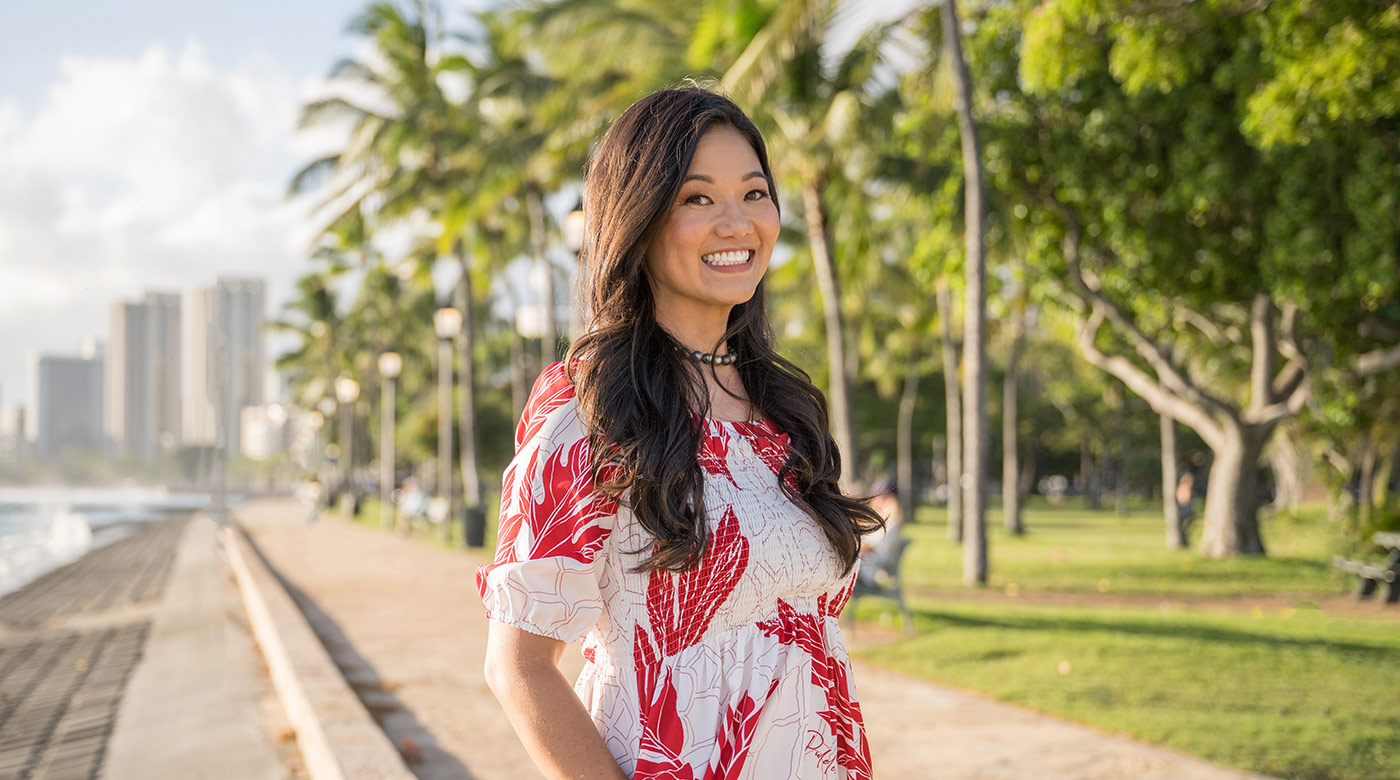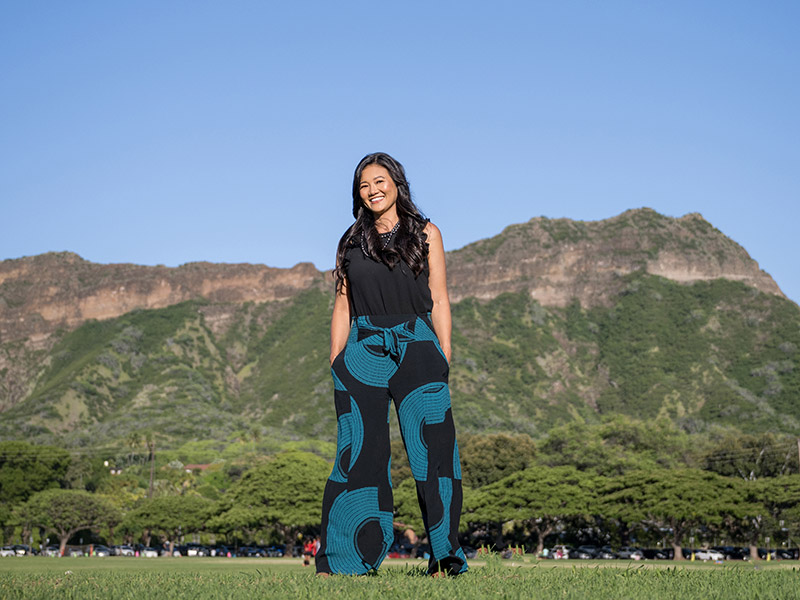Committed to Kuleana

Image: Cheri Souza ’01, MBA ’03 (Photographed by Joseph Esser)
By Sarah Nystrom MFA '22
Resolute Writer
Cheri Souza’s philanthropy leadership is motivated by the responsibility she feels to serve her Hawaiian community.
When Cheri Souza ’01, MBA ’03 first stepped onto campus at Pacific Lutheran University, the undergraduate from Hawai‘i could not have imagined her future would include redefining philanthropic efforts in support of her beloved home state.
“Visiting college campuses was only the second time I had left the island,” says Souza. “Yet there was a sense of community at PLU that felt like home.” While majoring in broadcast journalism, Souza worked in the communications department, including at Mast TV, a student-run television station.
“Gaining so much hands-on experience and getting to know the professors and visiting professionals significantly enriched my student experience,” says Souza.
The proximity of the television market in nearby Seattle provided Souza with her first professional job after graduation at KOMO-TV. She thrived in the high-energy environment. Unfortunately, following September 11, 2001, Souza and others in the media industry were impacted by mass layoffs due to the economic impacts of the terrorist attacks.
But the unfortunate event offered an unforeseen opportunity.
While grocery shopping, Souza saw a familiar face from her PLU days — Edward Inch, then dean of PLU’s School of Arts and Communication (and current president at Minnesota State University). As they caught up, Souza mentioned her recent layoff. Inch encouraged her to apply for an open position in his office.

She was offered the job as Inch’s administrative assistant. Inch recommended she obtain a Master of Business Administration and Souza graduated from PLU’s MBA program in 2003.
Soon after, she became the graduate program coordinator at California State University — Fullerton. At Fullerton, Souza realized she enjoyed working with students in higher education. Although the work was gratifying, Souza longed for home.
The opportunity would come her way organically: at a conference where Souza met the associate dean of the Shidler College of Business at the University of Hawai‘i at Mānoa. The two higher education professionals connected on their love of Hawai‘i and their passion for supporting students.
Souza moved home and for the next 15 years she worked throughout the University of Hawai‘i system. She helped bring a full-time MBA program to the College of Business, recruiting students from the U.S. and abroad.
“Launching the state’s only public full-time MBA program was an incredible privilege,” Souza says. “It was immensely gratifying to expand educational opportunities for Hawai‘i’s students, knowing the long-term benefits would positively impact our state for generations to come.”
The years flew by, and by 2020, Souza was a tenured associate professor at Kapi‘olani Community College. During COVID, she was recruited to the University of Hawai‘i Community Colleges Office, where she co-led a grant-funded statewide initiative aimed at increasing the college-going rate of Hawai‘i high school graduates. That is how Souza discovered the Stupski Foundation.
Larry and Joyce Stupski established the foundation with a vision based on justice, equity, and community. The foundation’s work focused on the communities the Stupski family called home — the San Francisco Bay Area and Hawai‘i.
The community emphasis intrigued Souza. “The mission of the Stupski Foundation deeply resonated with me. In Hawai‘i, we have a concept of kuleana, a responsibility to our ‘āina (land), community, people, and state. I felt like there was a deep values alignment at the foundation and saw this as an opportunity to play a small role in stopping the culture and brain drain that is taking Hawai‘i’s young people away from our islands.”
Souza knew she wanted to be involved in that work. She left her career in higher education for a philanthropic role, developing and implementing the foundation’s strategy for the Hawai‘i Post Secondary Success portfolio.
“This involved a lot of deep listening. I was invited into our communities and asked them what was needed to achieve a future where our young people could confidently choose to live, work, and thrive in the communities they called home,” Souza explains. “The result was a three-fold approach rooted in community resiliency and community power-building, prioritizing neighbor islands and rural communities.”
Souza manages a portfolio of about 80 grantees that includes community organizations and institutional partners. She spends much of her time visiting with her grantees and gathering information, feedback, lessons learned, and impacts made.
“I love what I do and listening to what our partners are really saying. Addressing their needs fosters collaborative efforts that effectively tackle root challenges and fulfill genuine needs in impactful ways,” Souza says. “Building trust-based relationships is one of the most important aspects of my role. It has enabled me to be invited into community, where I have been fortunate to learn alongside our partners and experience their obstacles firsthand.”
“For example,” Souza says, “a student residing in Kailua-Kona on Hawai‘i who attends the island’s only university, would have to travel over 150 miles roundtrip to attend an in-person class.” It is disparities like these that Souza is passionately working to eliminate.
A hallmark feature of Stupski is how the foundation, supported by its CEO and board members, trusts and empowers people with first-hand knowledge of the communities it serves.
“They center the communities and the youth voices,” Souza explains. “They want to shift power, policy, and practices, and to do that requires trusting the people with the lived experiences.”
Because the Stupski Foundation wants to achieve marked and lasting change, it adopted a spend-down approach. This means the foundation will close in 2029 after infusing the two communities with all its resources.
Final grants will go out in 2027, but staff are already working with grantees to prepare them for the transition and empower them for future success. The foundation is relinquishing control and embracing grantee empowerment, offering increased autonomy, opportunities for learning, and assistance in fostering collaborative relationships statewide.
The revolutionary approach means change can continue even after the Stupski Foundation ends.
Asked what is next for her after 2029, Souza laughed.
“I never imagined I would work in philanthropy,” says Souza. “I didn’t have a background in it. But it was an opportunity I could not pass up, so looking past 2029 I am open to all possibilities.”
Yet Souza is certain about one thing. “Care is a personal value. I love that it is a value of PLU, and I’ve been honored to be a part of the care Stupski Foundation shows our communities.”
“Whatever work I ultimately do next, it will be centered on caring for people.”


